Healthcare System: Evaluating Social, Economic, and Political Policies
VerifiedAdded on 2023/01/11
|12
|3405
|73
Report
AI Summary
This report provides a comprehensive analysis of social, economic, and political policies within the healthcare system. It begins by highlighting the significance of these policies in shaping healthcare development, emphasizing their equal importance in addressing health inequalities. The report explores how social policies impact discrimination and unequal access to care, political policies influence patient rights and democratic effectiveness, and economic policies strive for equitable resource allocation. The main body delves into the interconnectedness of economics, politics, and social policy in healthcare, emphasizing the exacerbating effects of social policies on health inequalities and the role of political decisions in shaping healthcare systems. It also discusses economic policies related to funding, insurance, and resource allocation, including the necessity of rationing to balance healthcare facilities with the economy. The report examines the economic evaluation of rationing, considering its role in achieving universal health coverage and its various stages of implementation. The conclusion summarizes the key issues and the need for policy implementation to improve healthcare outcomes, particularly in developing countries. The report emphasizes the importance of social and economic policies in addressing disparities and ensuring equitable access to healthcare.
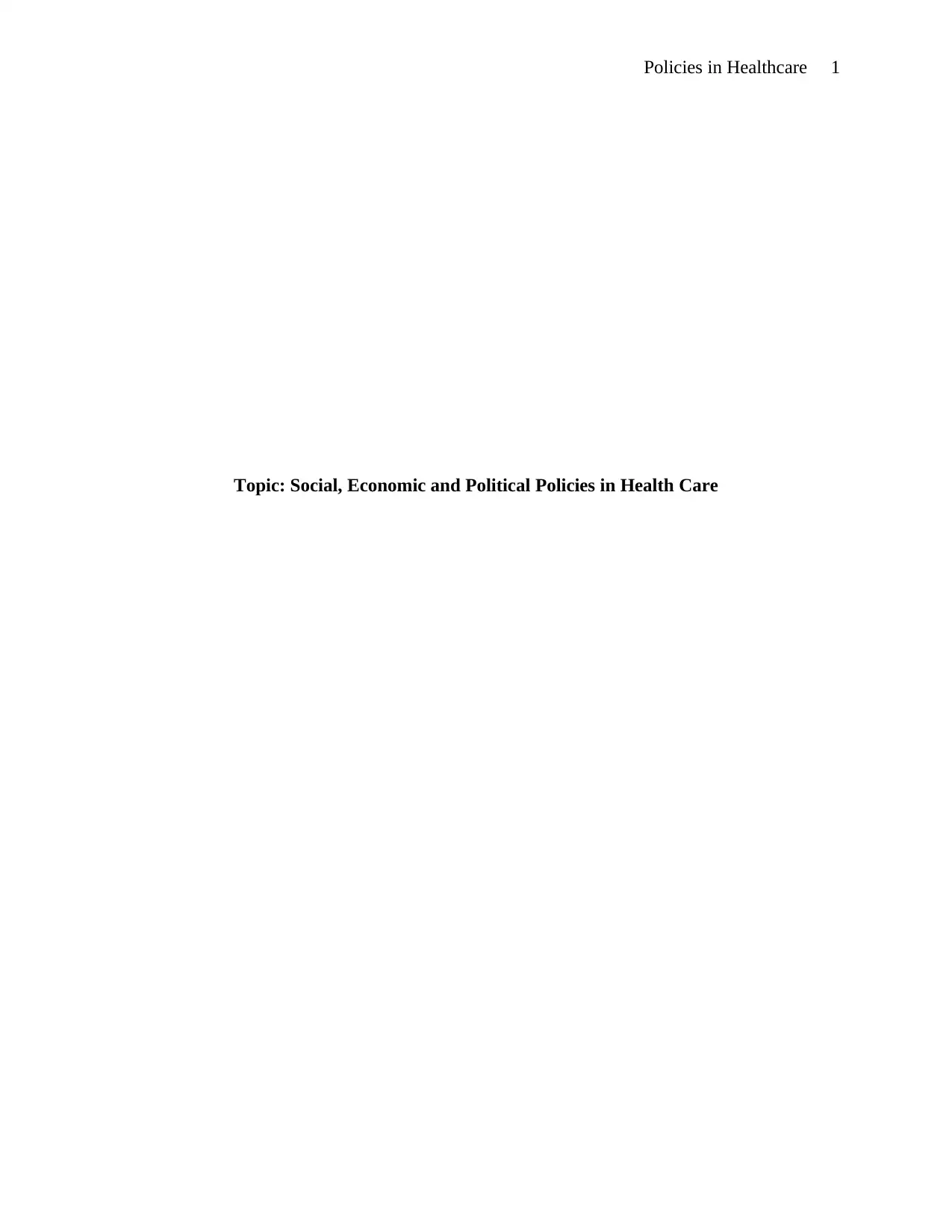
Policies in Healthcare 1
Topic: Social, Economic and Political Policies in Health Care
Topic: Social, Economic and Political Policies in Health Care
Paraphrase This Document
Need a fresh take? Get an instant paraphrase of this document with our AI Paraphraser
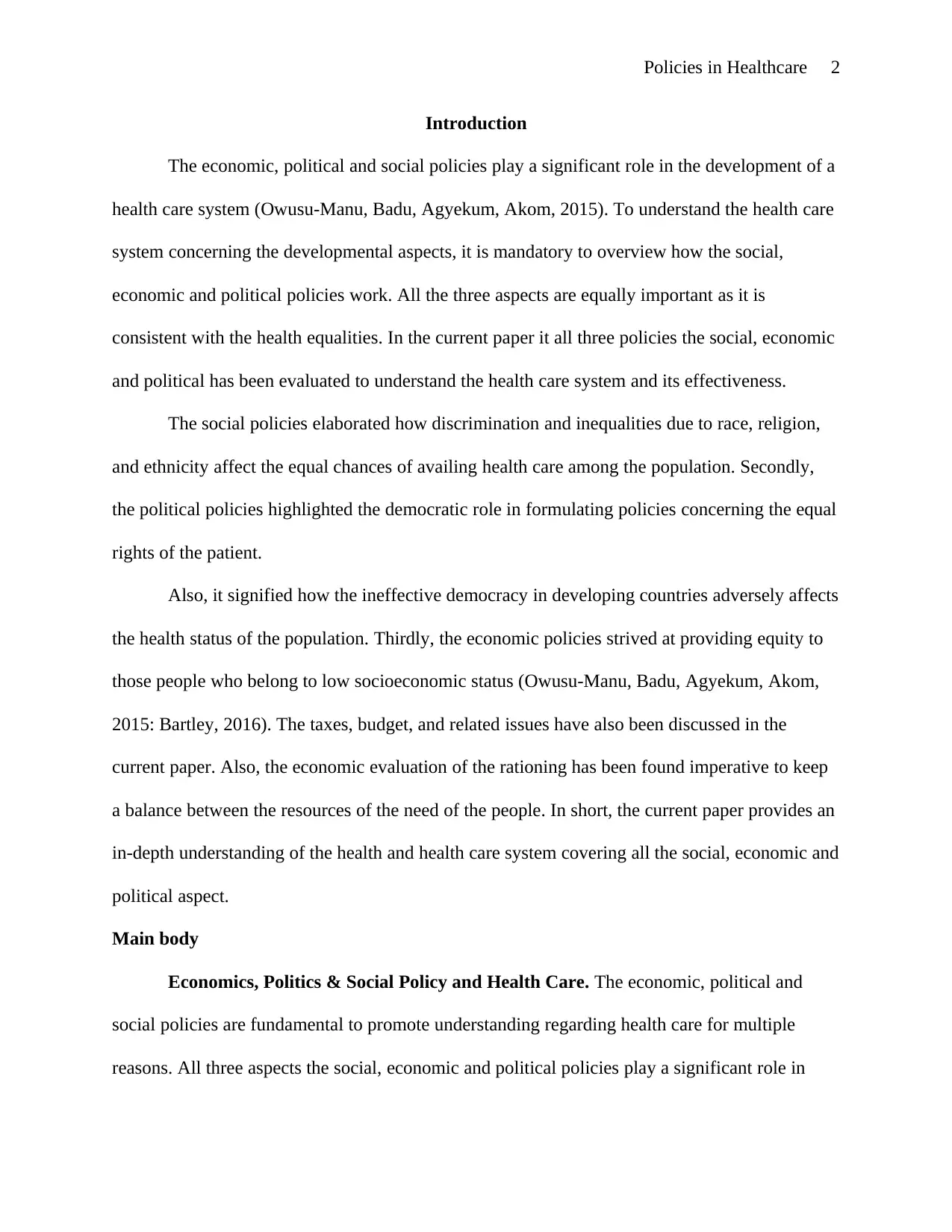
Policies in Healthcare 2
Introduction
The economic, political and social policies play a significant role in the development of a
health care system (Owusu-Manu, Badu, Agyekum, Akom, 2015). To understand the health care
system concerning the developmental aspects, it is mandatory to overview how the social,
economic and political policies work. All the three aspects are equally important as it is
consistent with the health equalities. In the current paper it all three policies the social, economic
and political has been evaluated to understand the health care system and its effectiveness.
The social policies elaborated how discrimination and inequalities due to race, religion,
and ethnicity affect the equal chances of availing health care among the population. Secondly,
the political policies highlighted the democratic role in formulating policies concerning the equal
rights of the patient.
Also, it signified how the ineffective democracy in developing countries adversely affects
the health status of the population. Thirdly, the economic policies strived at providing equity to
those people who belong to low socioeconomic status (Owusu-Manu, Badu, Agyekum, Akom,
2015: Bartley, 2016). The taxes, budget, and related issues have also been discussed in the
current paper. Also, the economic evaluation of the rationing has been found imperative to keep
a balance between the resources of the need of the people. In short, the current paper provides an
in-depth understanding of the health and health care system covering all the social, economic and
political aspect.
Main body
Economics, Politics & Social Policy and Health Care. The economic, political and
social policies are fundamental to promote understanding regarding health care for multiple
reasons. All three aspects the social, economic and political policies play a significant role in
Introduction
The economic, political and social policies play a significant role in the development of a
health care system (Owusu-Manu, Badu, Agyekum, Akom, 2015). To understand the health care
system concerning the developmental aspects, it is mandatory to overview how the social,
economic and political policies work. All the three aspects are equally important as it is
consistent with the health equalities. In the current paper it all three policies the social, economic
and political has been evaluated to understand the health care system and its effectiveness.
The social policies elaborated how discrimination and inequalities due to race, religion,
and ethnicity affect the equal chances of availing health care among the population. Secondly,
the political policies highlighted the democratic role in formulating policies concerning the equal
rights of the patient.
Also, it signified how the ineffective democracy in developing countries adversely affects
the health status of the population. Thirdly, the economic policies strived at providing equity to
those people who belong to low socioeconomic status (Owusu-Manu, Badu, Agyekum, Akom,
2015: Bartley, 2016). The taxes, budget, and related issues have also been discussed in the
current paper. Also, the economic evaluation of the rationing has been found imperative to keep
a balance between the resources of the need of the people. In short, the current paper provides an
in-depth understanding of the health and health care system covering all the social, economic and
political aspect.
Main body
Economics, Politics & Social Policy and Health Care. The economic, political and
social policies are fundamental to promote understanding regarding health care for multiple
reasons. All three aspects the social, economic and political policies play a significant role in
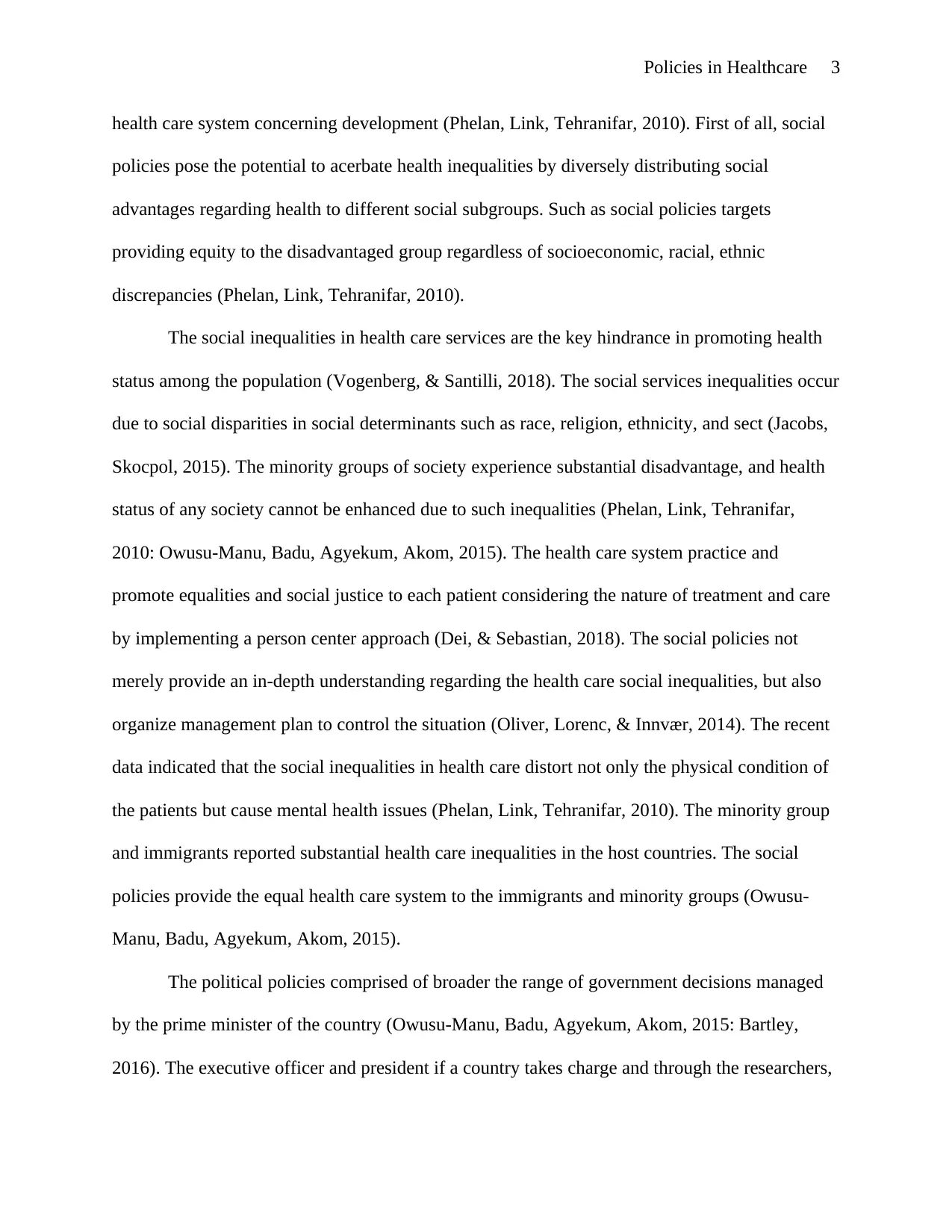
Policies in Healthcare 3
health care system concerning development (Phelan, Link, Tehranifar, 2010). First of all, social
policies pose the potential to acerbate health inequalities by diversely distributing social
advantages regarding health to different social subgroups. Such as social policies targets
providing equity to the disadvantaged group regardless of socioeconomic, racial, ethnic
discrepancies (Phelan, Link, Tehranifar, 2010).
The social inequalities in health care services are the key hindrance in promoting health
status among the population (Vogenberg, & Santilli, 2018). The social services inequalities occur
due to social disparities in social determinants such as race, religion, ethnicity, and sect (Jacobs,
Skocpol, 2015). The minority groups of society experience substantial disadvantage, and health
status of any society cannot be enhanced due to such inequalities (Phelan, Link, Tehranifar,
2010: Owusu-Manu, Badu, Agyekum, Akom, 2015). The health care system practice and
promote equalities and social justice to each patient considering the nature of treatment and care
by implementing a person center approach (Dei, & Sebastian, 2018). The social policies not
merely provide an in-depth understanding regarding the health care social inequalities, but also
organize management plan to control the situation (Oliver, Lorenc, & Innvær, 2014). The recent
data indicated that the social inequalities in health care distort not only the physical condition of
the patients but cause mental health issues (Phelan, Link, Tehranifar, 2010). The minority group
and immigrants reported substantial health care inequalities in the host countries. The social
policies provide the equal health care system to the immigrants and minority groups (Owusu-
Manu, Badu, Agyekum, Akom, 2015).
The political policies comprised of broader the range of government decisions managed
by the prime minister of the country (Owusu-Manu, Badu, Agyekum, Akom, 2015: Bartley,
2016). The executive officer and president if a country takes charge and through the researchers,
health care system concerning development (Phelan, Link, Tehranifar, 2010). First of all, social
policies pose the potential to acerbate health inequalities by diversely distributing social
advantages regarding health to different social subgroups. Such as social policies targets
providing equity to the disadvantaged group regardless of socioeconomic, racial, ethnic
discrepancies (Phelan, Link, Tehranifar, 2010).
The social inequalities in health care services are the key hindrance in promoting health
status among the population (Vogenberg, & Santilli, 2018). The social services inequalities occur
due to social disparities in social determinants such as race, religion, ethnicity, and sect (Jacobs,
Skocpol, 2015). The minority groups of society experience substantial disadvantage, and health
status of any society cannot be enhanced due to such inequalities (Phelan, Link, Tehranifar,
2010: Owusu-Manu, Badu, Agyekum, Akom, 2015). The health care system practice and
promote equalities and social justice to each patient considering the nature of treatment and care
by implementing a person center approach (Dei, & Sebastian, 2018). The social policies not
merely provide an in-depth understanding regarding the health care social inequalities, but also
organize management plan to control the situation (Oliver, Lorenc, & Innvær, 2014). The recent
data indicated that the social inequalities in health care distort not only the physical condition of
the patients but cause mental health issues (Phelan, Link, Tehranifar, 2010). The minority group
and immigrants reported substantial health care inequalities in the host countries. The social
policies provide the equal health care system to the immigrants and minority groups (Owusu-
Manu, Badu, Agyekum, Akom, 2015).
The political policies comprised of broader the range of government decisions managed
by the prime minister of the country (Owusu-Manu, Badu, Agyekum, Akom, 2015: Bartley,
2016). The executive officer and president if a country takes charge and through the researchers,
⊘ This is a preview!⊘
Do you want full access?
Subscribe today to unlock all pages.

Trusted by 1+ million students worldwide
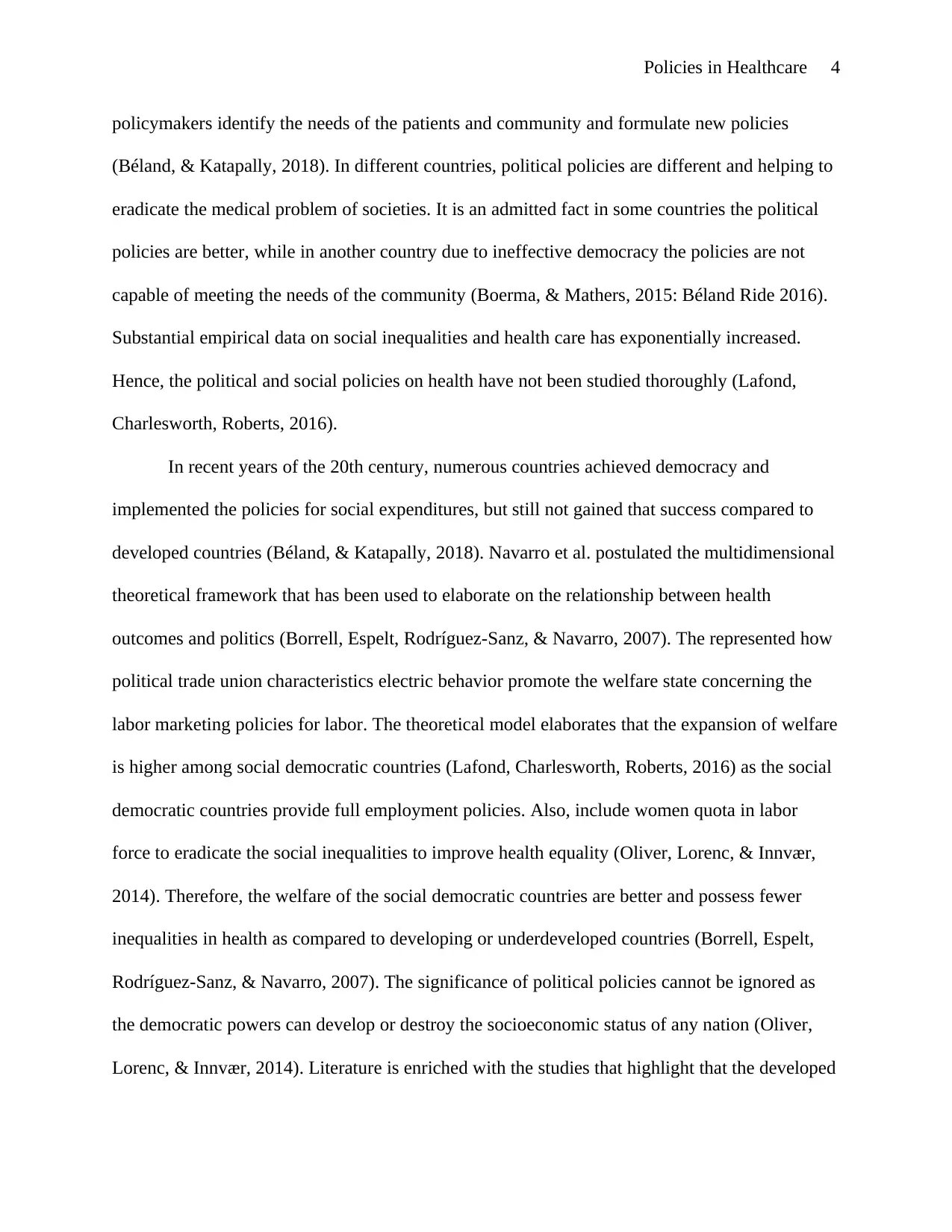
Policies in Healthcare 4
policymakers identify the needs of the patients and community and formulate new policies
(Béland, & Katapally, 2018). In different countries, political policies are different and helping to
eradicate the medical problem of societies. It is an admitted fact in some countries the political
policies are better, while in another country due to ineffective democracy the policies are not
capable of meeting the needs of the community (Boerma, & Mathers, 2015: Béland Ride 2016).
Substantial empirical data on social inequalities and health care has exponentially increased.
Hence, the political and social policies on health have not been studied thoroughly (Lafond,
Charlesworth, Roberts, 2016).
In recent years of the 20th century, numerous countries achieved democracy and
implemented the policies for social expenditures, but still not gained that success compared to
developed countries (Béland, & Katapally, 2018). Navarro et al. postulated the multidimensional
theoretical framework that has been used to elaborate on the relationship between health
outcomes and politics (Borrell, Espelt, Rodríguez-Sanz, & Navarro, 2007). The represented how
political trade union characteristics electric behavior promote the welfare state concerning the
labor marketing policies for labor. The theoretical model elaborates that the expansion of welfare
is higher among social democratic countries (Lafond, Charlesworth, Roberts, 2016) as the social
democratic countries provide full employment policies. Also, include women quota in labor
force to eradicate the social inequalities to improve health equality (Oliver, Lorenc, & Innvær,
2014). Therefore, the welfare of the social democratic countries are better and possess fewer
inequalities in health as compared to developing or underdeveloped countries (Borrell, Espelt,
Rodríguez-Sanz, & Navarro, 2007). The significance of political policies cannot be ignored as
the democratic powers can develop or destroy the socioeconomic status of any nation (Oliver,
Lorenc, & Innvær, 2014). Literature is enriched with the studies that highlight that the developed
policymakers identify the needs of the patients and community and formulate new policies
(Béland, & Katapally, 2018). In different countries, political policies are different and helping to
eradicate the medical problem of societies. It is an admitted fact in some countries the political
policies are better, while in another country due to ineffective democracy the policies are not
capable of meeting the needs of the community (Boerma, & Mathers, 2015: Béland Ride 2016).
Substantial empirical data on social inequalities and health care has exponentially increased.
Hence, the political and social policies on health have not been studied thoroughly (Lafond,
Charlesworth, Roberts, 2016).
In recent years of the 20th century, numerous countries achieved democracy and
implemented the policies for social expenditures, but still not gained that success compared to
developed countries (Béland, & Katapally, 2018). Navarro et al. postulated the multidimensional
theoretical framework that has been used to elaborate on the relationship between health
outcomes and politics (Borrell, Espelt, Rodríguez-Sanz, & Navarro, 2007). The represented how
political trade union characteristics electric behavior promote the welfare state concerning the
labor marketing policies for labor. The theoretical model elaborates that the expansion of welfare
is higher among social democratic countries (Lafond, Charlesworth, Roberts, 2016) as the social
democratic countries provide full employment policies. Also, include women quota in labor
force to eradicate the social inequalities to improve health equality (Oliver, Lorenc, & Innvær,
2014). Therefore, the welfare of the social democratic countries are better and possess fewer
inequalities in health as compared to developing or underdeveloped countries (Borrell, Espelt,
Rodríguez-Sanz, & Navarro, 2007). The significance of political policies cannot be ignored as
the democratic powers can develop or destroy the socioeconomic status of any nation (Oliver,
Lorenc, & Innvær, 2014). Literature is enriched with the studies that highlight that the developed
Paraphrase This Document
Need a fresh take? Get an instant paraphrase of this document with our AI Paraphraser
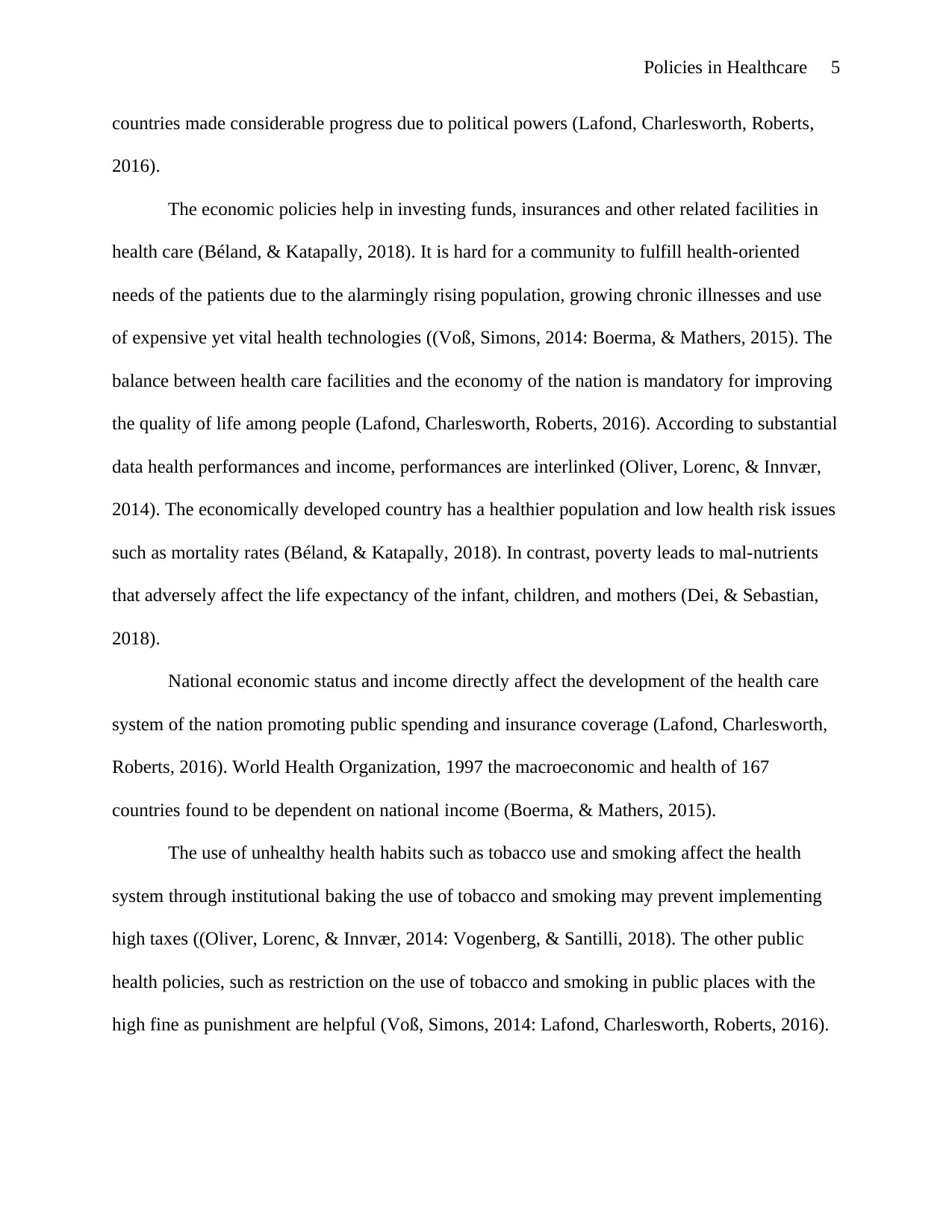
Policies in Healthcare 5
countries made considerable progress due to political powers (Lafond, Charlesworth, Roberts,
2016).
The economic policies help in investing funds, insurances and other related facilities in
health care (Béland, & Katapally, 2018). It is hard for a community to fulfill health-oriented
needs of the patients due to the alarmingly rising population, growing chronic illnesses and use
of expensive yet vital health technologies ((Voß, Simons, 2014: Boerma, & Mathers, 2015). The
balance between health care facilities and the economy of the nation is mandatory for improving
the quality of life among people (Lafond, Charlesworth, Roberts, 2016). According to substantial
data health performances and income, performances are interlinked (Oliver, Lorenc, & Innvær,
2014). The economically developed country has a healthier population and low health risk issues
such as mortality rates (Béland, & Katapally, 2018). In contrast, poverty leads to mal-nutrients
that adversely affect the life expectancy of the infant, children, and mothers (Dei, & Sebastian,
2018).
National economic status and income directly affect the development of the health care
system of the nation promoting public spending and insurance coverage (Lafond, Charlesworth,
Roberts, 2016). World Health Organization, 1997 the macroeconomic and health of 167
countries found to be dependent on national income (Boerma, & Mathers, 2015).
The use of unhealthy health habits such as tobacco use and smoking affect the health
system through institutional baking the use of tobacco and smoking may prevent implementing
high taxes ((Oliver, Lorenc, & Innvær, 2014: Vogenberg, & Santilli, 2018). The other public
health policies, such as restriction on the use of tobacco and smoking in public places with the
high fine as punishment are helpful (Voß, Simons, 2014: Lafond, Charlesworth, Roberts, 2016).
countries made considerable progress due to political powers (Lafond, Charlesworth, Roberts,
2016).
The economic policies help in investing funds, insurances and other related facilities in
health care (Béland, & Katapally, 2018). It is hard for a community to fulfill health-oriented
needs of the patients due to the alarmingly rising population, growing chronic illnesses and use
of expensive yet vital health technologies ((Voß, Simons, 2014: Boerma, & Mathers, 2015). The
balance between health care facilities and the economy of the nation is mandatory for improving
the quality of life among people (Lafond, Charlesworth, Roberts, 2016). According to substantial
data health performances and income, performances are interlinked (Oliver, Lorenc, & Innvær,
2014). The economically developed country has a healthier population and low health risk issues
such as mortality rates (Béland, & Katapally, 2018). In contrast, poverty leads to mal-nutrients
that adversely affect the life expectancy of the infant, children, and mothers (Dei, & Sebastian,
2018).
National economic status and income directly affect the development of the health care
system of the nation promoting public spending and insurance coverage (Lafond, Charlesworth,
Roberts, 2016). World Health Organization, 1997 the macroeconomic and health of 167
countries found to be dependent on national income (Boerma, & Mathers, 2015).
The use of unhealthy health habits such as tobacco use and smoking affect the health
system through institutional baking the use of tobacco and smoking may prevent implementing
high taxes ((Oliver, Lorenc, & Innvær, 2014: Vogenberg, & Santilli, 2018). The other public
health policies, such as restriction on the use of tobacco and smoking in public places with the
high fine as punishment are helpful (Voß, Simons, 2014: Lafond, Charlesworth, Roberts, 2016).
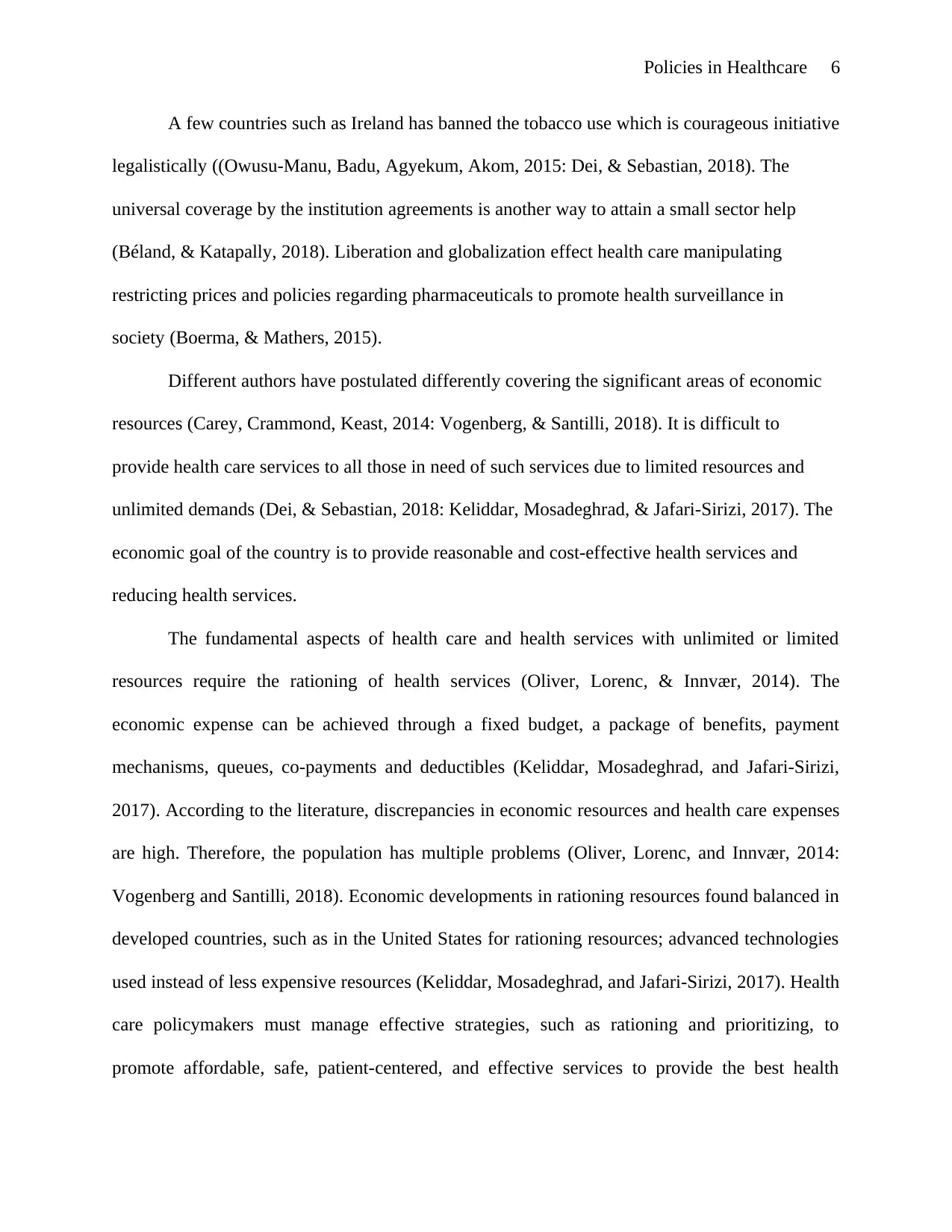
Policies in Healthcare 6
A few countries such as Ireland has banned the tobacco use which is courageous initiative
legalistically ((Owusu-Manu, Badu, Agyekum, Akom, 2015: Dei, & Sebastian, 2018). The
universal coverage by the institution agreements is another way to attain a small sector help
(Béland, & Katapally, 2018). Liberation and globalization effect health care manipulating
restricting prices and policies regarding pharmaceuticals to promote health surveillance in
society (Boerma, & Mathers, 2015).
Different authors have postulated differently covering the significant areas of economic
resources (Carey, Crammond, Keast, 2014: Vogenberg, & Santilli, 2018). It is difficult to
provide health care services to all those in need of such services due to limited resources and
unlimited demands (Dei, & Sebastian, 2018: Keliddar, Mosadeghrad, & Jafari-Sirizi, 2017). The
economic goal of the country is to provide reasonable and cost-effective health services and
reducing health services.
The fundamental aspects of health care and health services with unlimited or limited
resources require the rationing of health services (Oliver, Lorenc, & Innvær, 2014). The
economic expense can be achieved through a fixed budget, a package of benefits, payment
mechanisms, queues, co-payments and deductibles (Keliddar, Mosadeghrad, and Jafari-Sirizi,
2017). According to the literature, discrepancies in economic resources and health care expenses
are high. Therefore, the population has multiple problems (Oliver, Lorenc, and Innvær, 2014:
Vogenberg and Santilli, 2018). Economic developments in rationing resources found balanced in
developed countries, such as in the United States for rationing resources; advanced technologies
used instead of less expensive resources (Keliddar, Mosadeghrad, and Jafari-Sirizi, 2017). Health
care policymakers must manage effective strategies, such as rationing and prioritizing, to
promote affordable, safe, patient-centered, and effective services to provide the best health
A few countries such as Ireland has banned the tobacco use which is courageous initiative
legalistically ((Owusu-Manu, Badu, Agyekum, Akom, 2015: Dei, & Sebastian, 2018). The
universal coverage by the institution agreements is another way to attain a small sector help
(Béland, & Katapally, 2018). Liberation and globalization effect health care manipulating
restricting prices and policies regarding pharmaceuticals to promote health surveillance in
society (Boerma, & Mathers, 2015).
Different authors have postulated differently covering the significant areas of economic
resources (Carey, Crammond, Keast, 2014: Vogenberg, & Santilli, 2018). It is difficult to
provide health care services to all those in need of such services due to limited resources and
unlimited demands (Dei, & Sebastian, 2018: Keliddar, Mosadeghrad, & Jafari-Sirizi, 2017). The
economic goal of the country is to provide reasonable and cost-effective health services and
reducing health services.
The fundamental aspects of health care and health services with unlimited or limited
resources require the rationing of health services (Oliver, Lorenc, & Innvær, 2014). The
economic expense can be achieved through a fixed budget, a package of benefits, payment
mechanisms, queues, co-payments and deductibles (Keliddar, Mosadeghrad, and Jafari-Sirizi,
2017). According to the literature, discrepancies in economic resources and health care expenses
are high. Therefore, the population has multiple problems (Oliver, Lorenc, and Innvær, 2014:
Vogenberg and Santilli, 2018). Economic developments in rationing resources found balanced in
developed countries, such as in the United States for rationing resources; advanced technologies
used instead of less expensive resources (Keliddar, Mosadeghrad, and Jafari-Sirizi, 2017). Health
care policymakers must manage effective strategies, such as rationing and prioritizing, to
promote affordable, safe, patient-centered, and effective services to provide the best health
⊘ This is a preview!⊘
Do you want full access?
Subscribe today to unlock all pages.

Trusted by 1+ million students worldwide
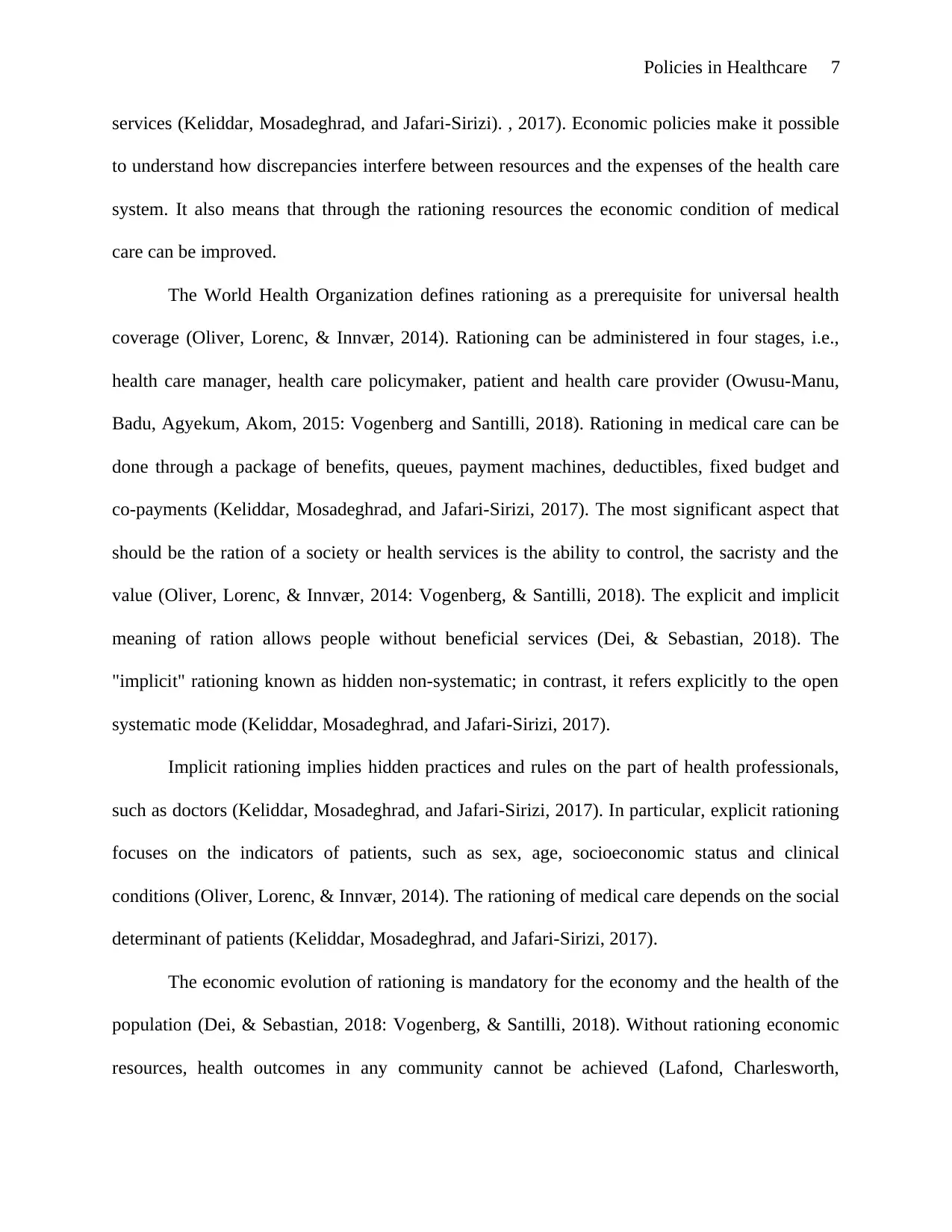
Policies in Healthcare 7
services (Keliddar, Mosadeghrad, and Jafari-Sirizi). , 2017). Economic policies make it possible
to understand how discrepancies interfere between resources and the expenses of the health care
system. It also means that through the rationing resources the economic condition of medical
care can be improved.
The World Health Organization defines rationing as a prerequisite for universal health
coverage (Oliver, Lorenc, & Innvær, 2014). Rationing can be administered in four stages, i.e.,
health care manager, health care policymaker, patient and health care provider (Owusu-Manu,
Badu, Agyekum, Akom, 2015: Vogenberg and Santilli, 2018). Rationing in medical care can be
done through a package of benefits, queues, payment machines, deductibles, fixed budget and
co-payments (Keliddar, Mosadeghrad, and Jafari-Sirizi, 2017). The most significant aspect that
should be the ration of a society or health services is the ability to control, the sacristy and the
value (Oliver, Lorenc, & Innvær, 2014: Vogenberg, & Santilli, 2018). The explicit and implicit
meaning of ration allows people without beneficial services (Dei, & Sebastian, 2018). The
"implicit" rationing known as hidden non-systematic; in contrast, it refers explicitly to the open
systematic mode (Keliddar, Mosadeghrad, and Jafari-Sirizi, 2017).
Implicit rationing implies hidden practices and rules on the part of health professionals,
such as doctors (Keliddar, Mosadeghrad, and Jafari-Sirizi, 2017). In particular, explicit rationing
focuses on the indicators of patients, such as sex, age, socioeconomic status and clinical
conditions (Oliver, Lorenc, & Innvær, 2014). The rationing of medical care depends on the social
determinant of patients (Keliddar, Mosadeghrad, and Jafari-Sirizi, 2017).
The economic evolution of rationing is mandatory for the economy and the health of the
population (Dei, & Sebastian, 2018: Vogenberg, & Santilli, 2018). Without rationing economic
resources, health outcomes in any community cannot be achieved (Lafond, Charlesworth,
services (Keliddar, Mosadeghrad, and Jafari-Sirizi). , 2017). Economic policies make it possible
to understand how discrepancies interfere between resources and the expenses of the health care
system. It also means that through the rationing resources the economic condition of medical
care can be improved.
The World Health Organization defines rationing as a prerequisite for universal health
coverage (Oliver, Lorenc, & Innvær, 2014). Rationing can be administered in four stages, i.e.,
health care manager, health care policymaker, patient and health care provider (Owusu-Manu,
Badu, Agyekum, Akom, 2015: Vogenberg and Santilli, 2018). Rationing in medical care can be
done through a package of benefits, queues, payment machines, deductibles, fixed budget and
co-payments (Keliddar, Mosadeghrad, and Jafari-Sirizi, 2017). The most significant aspect that
should be the ration of a society or health services is the ability to control, the sacristy and the
value (Oliver, Lorenc, & Innvær, 2014: Vogenberg, & Santilli, 2018). The explicit and implicit
meaning of ration allows people without beneficial services (Dei, & Sebastian, 2018). The
"implicit" rationing known as hidden non-systematic; in contrast, it refers explicitly to the open
systematic mode (Keliddar, Mosadeghrad, and Jafari-Sirizi, 2017).
Implicit rationing implies hidden practices and rules on the part of health professionals,
such as doctors (Keliddar, Mosadeghrad, and Jafari-Sirizi, 2017). In particular, explicit rationing
focuses on the indicators of patients, such as sex, age, socioeconomic status and clinical
conditions (Oliver, Lorenc, & Innvær, 2014). The rationing of medical care depends on the social
determinant of patients (Keliddar, Mosadeghrad, and Jafari-Sirizi, 2017).
The economic evolution of rationing is mandatory for the economy and the health of the
population (Dei, & Sebastian, 2018: Vogenberg, & Santilli, 2018). Without rationing economic
resources, health outcomes in any community cannot be achieved (Lafond, Charlesworth,
Paraphrase This Document
Need a fresh take? Get an instant paraphrase of this document with our AI Paraphraser
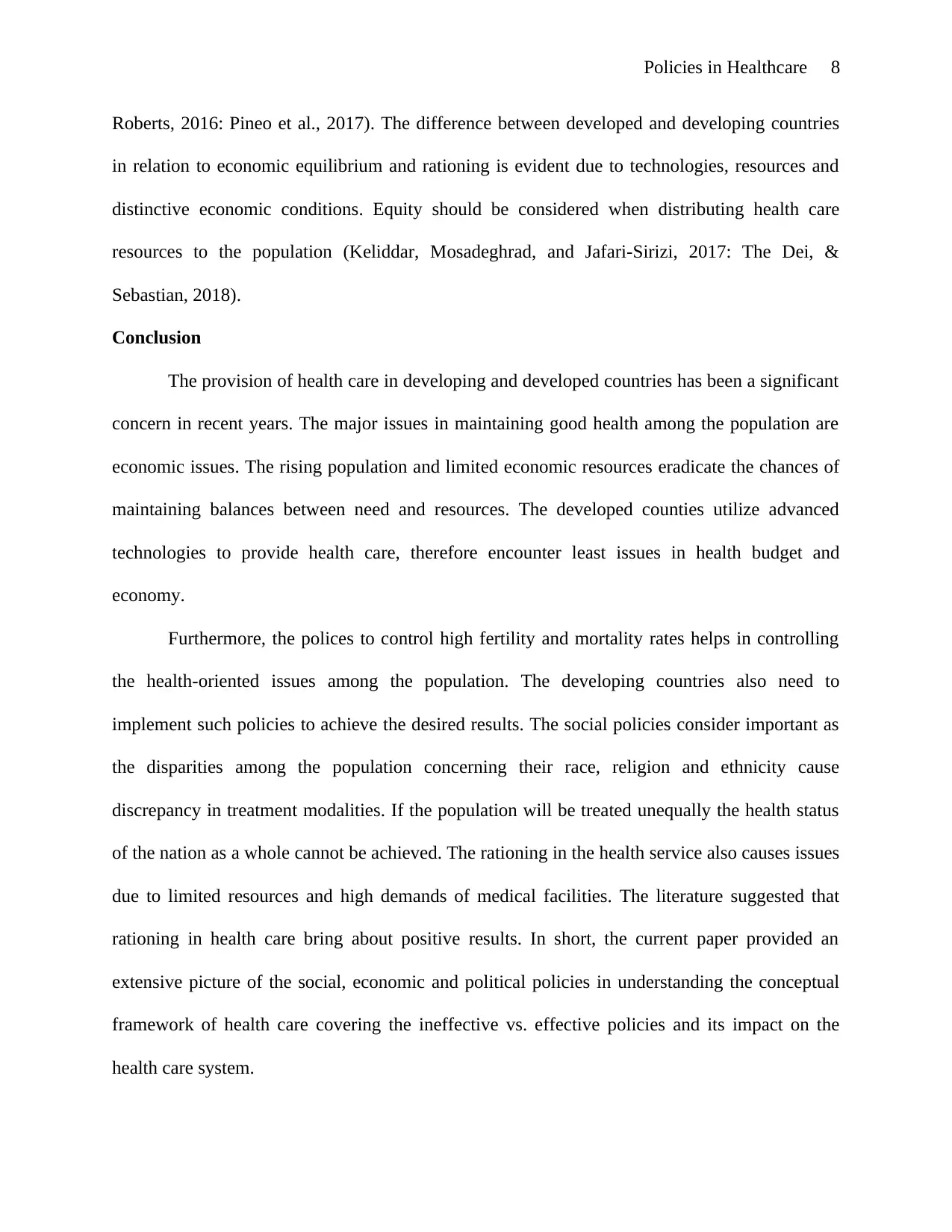
Policies in Healthcare 8
Roberts, 2016: Pineo et al., 2017). The difference between developed and developing countries
in relation to economic equilibrium and rationing is evident due to technologies, resources and
distinctive economic conditions. Equity should be considered when distributing health care
resources to the population (Keliddar, Mosadeghrad, and Jafari-Sirizi, 2017: The Dei, &
Sebastian, 2018).
Conclusion
The provision of health care in developing and developed countries has been a significant
concern in recent years. The major issues in maintaining good health among the population are
economic issues. The rising population and limited economic resources eradicate the chances of
maintaining balances between need and resources. The developed counties utilize advanced
technologies to provide health care, therefore encounter least issues in health budget and
economy.
Furthermore, the polices to control high fertility and mortality rates helps in controlling
the health-oriented issues among the population. The developing countries also need to
implement such policies to achieve the desired results. The social policies consider important as
the disparities among the population concerning their race, religion and ethnicity cause
discrepancy in treatment modalities. If the population will be treated unequally the health status
of the nation as a whole cannot be achieved. The rationing in the health service also causes issues
due to limited resources and high demands of medical facilities. The literature suggested that
rationing in health care bring about positive results. In short, the current paper provided an
extensive picture of the social, economic and political policies in understanding the conceptual
framework of health care covering the ineffective vs. effective policies and its impact on the
health care system.
Roberts, 2016: Pineo et al., 2017). The difference between developed and developing countries
in relation to economic equilibrium and rationing is evident due to technologies, resources and
distinctive economic conditions. Equity should be considered when distributing health care
resources to the population (Keliddar, Mosadeghrad, and Jafari-Sirizi, 2017: The Dei, &
Sebastian, 2018).
Conclusion
The provision of health care in developing and developed countries has been a significant
concern in recent years. The major issues in maintaining good health among the population are
economic issues. The rising population and limited economic resources eradicate the chances of
maintaining balances between need and resources. The developed counties utilize advanced
technologies to provide health care, therefore encounter least issues in health budget and
economy.
Furthermore, the polices to control high fertility and mortality rates helps in controlling
the health-oriented issues among the population. The developing countries also need to
implement such policies to achieve the desired results. The social policies consider important as
the disparities among the population concerning their race, religion and ethnicity cause
discrepancy in treatment modalities. If the population will be treated unequally the health status
of the nation as a whole cannot be achieved. The rationing in the health service also causes issues
due to limited resources and high demands of medical facilities. The literature suggested that
rationing in health care bring about positive results. In short, the current paper provided an
extensive picture of the social, economic and political policies in understanding the conceptual
framework of health care covering the ineffective vs. effective policies and its impact on the
health care system.
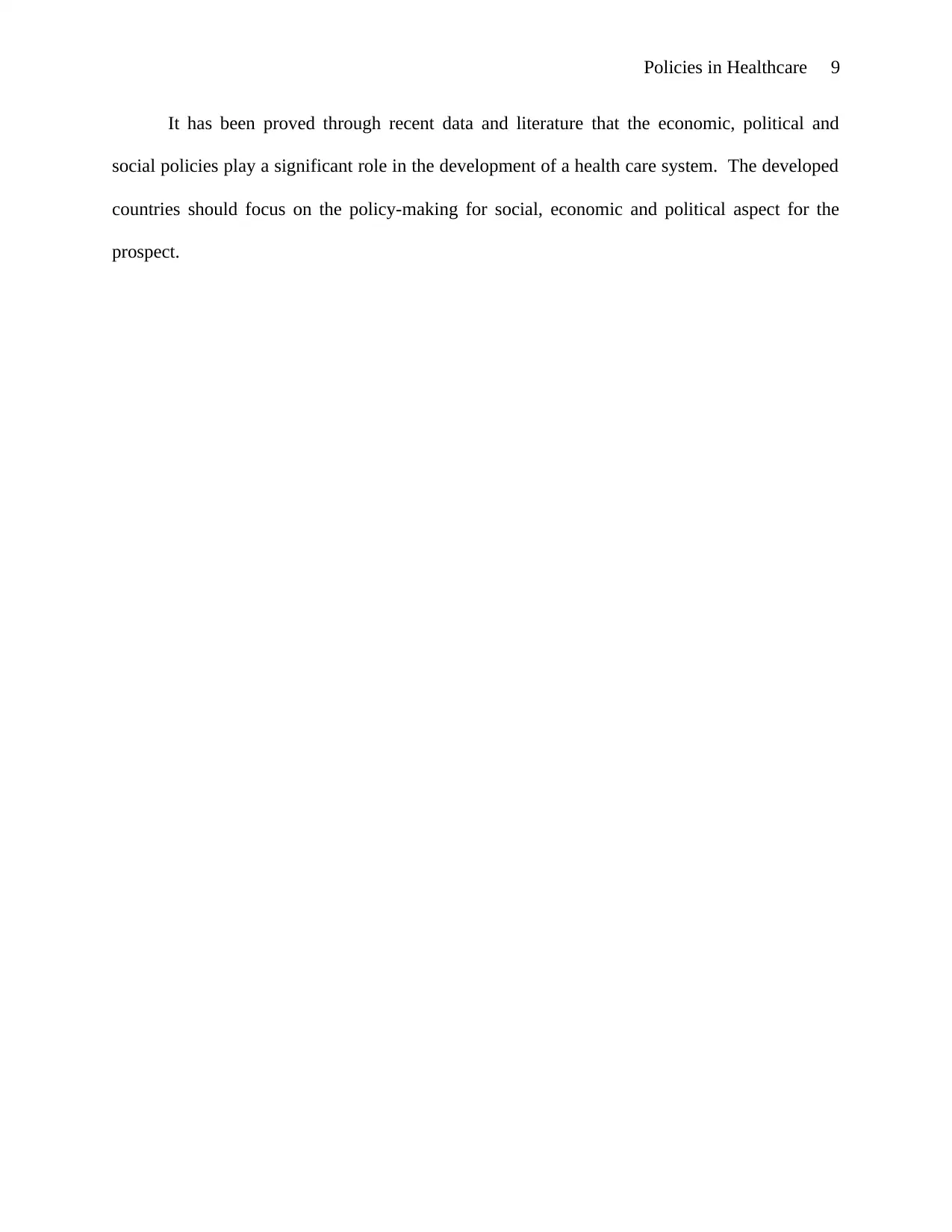
Policies in Healthcare 9
It has been proved through recent data and literature that the economic, political and
social policies play a significant role in the development of a health care system. The developed
countries should focus on the policy-making for social, economic and political aspect for the
prospect.
It has been proved through recent data and literature that the economic, political and
social policies play a significant role in the development of a health care system. The developed
countries should focus on the policy-making for social, economic and political aspect for the
prospect.
⊘ This is a preview!⊘
Do you want full access?
Subscribe today to unlock all pages.

Trusted by 1+ million students worldwide
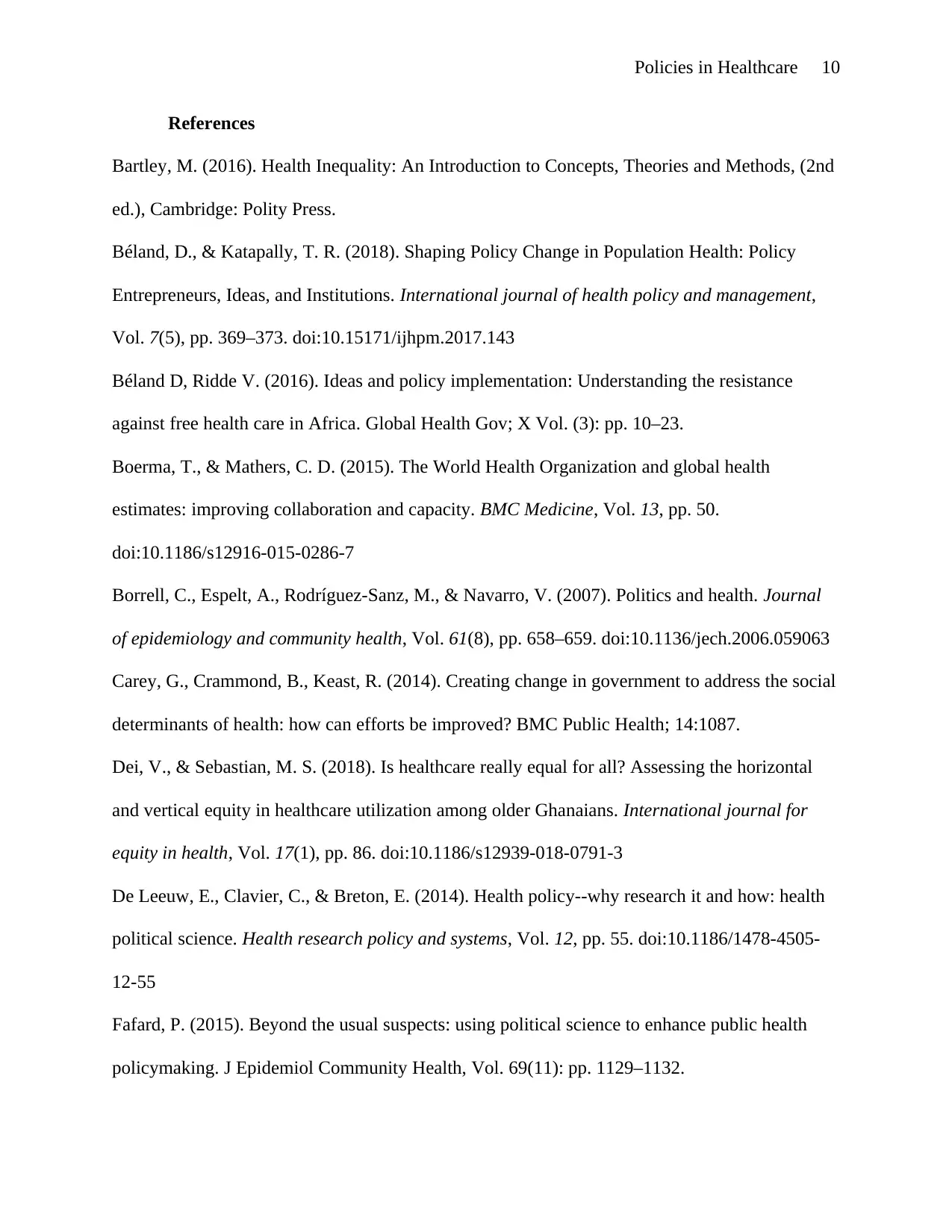
Policies in Healthcare 10
References
Bartley, M. (2016). Health Inequality: An Introduction to Concepts, Theories and Methods, (2nd
ed.), Cambridge: Polity Press.
Béland, D., & Katapally, T. R. (2018). Shaping Policy Change in Population Health: Policy
Entrepreneurs, Ideas, and Institutions. International journal of health policy and management,
Vol. 7(5), pp. 369–373. doi:10.15171/ijhpm.2017.143
Béland D, Ridde V. (2016). Ideas and policy implementation: Understanding the resistance
against free health care in Africa. Global Health Gov; X Vol. (3): pp. 10–23.
Boerma, T., & Mathers, C. D. (2015). The World Health Organization and global health
estimates: improving collaboration and capacity. BMC Medicine, Vol. 13, pp. 50.
doi:10.1186/s12916-015-0286-7
Borrell, C., Espelt, A., Rodríguez-Sanz, M., & Navarro, V. (2007). Politics and health. Journal
of epidemiology and community health, Vol. 61(8), pp. 658–659. doi:10.1136/jech.2006.059063
Carey, G., Crammond, B., Keast, R. (2014). Creating change in government to address the social
determinants of health: how can efforts be improved? BMC Public Health; 14:1087.
Dei, V., & Sebastian, M. S. (2018). Is healthcare really equal for all? Assessing the horizontal
and vertical equity in healthcare utilization among older Ghanaians. International journal for
equity in health, Vol. 17(1), pp. 86. doi:10.1186/s12939-018-0791-3
De Leeuw, E., Clavier, C., & Breton, E. (2014). Health policy--why research it and how: health
political science. Health research policy and systems, Vol. 12, pp. 55. doi:10.1186/1478-4505-
12-55
Fafard, P. (2015). Beyond the usual suspects: using political science to enhance public health
policymaking. J Epidemiol Community Health, Vol. 69(11): pp. 1129–1132.
References
Bartley, M. (2016). Health Inequality: An Introduction to Concepts, Theories and Methods, (2nd
ed.), Cambridge: Polity Press.
Béland, D., & Katapally, T. R. (2018). Shaping Policy Change in Population Health: Policy
Entrepreneurs, Ideas, and Institutions. International journal of health policy and management,
Vol. 7(5), pp. 369–373. doi:10.15171/ijhpm.2017.143
Béland D, Ridde V. (2016). Ideas and policy implementation: Understanding the resistance
against free health care in Africa. Global Health Gov; X Vol. (3): pp. 10–23.
Boerma, T., & Mathers, C. D. (2015). The World Health Organization and global health
estimates: improving collaboration and capacity. BMC Medicine, Vol. 13, pp. 50.
doi:10.1186/s12916-015-0286-7
Borrell, C., Espelt, A., Rodríguez-Sanz, M., & Navarro, V. (2007). Politics and health. Journal
of epidemiology and community health, Vol. 61(8), pp. 658–659. doi:10.1136/jech.2006.059063
Carey, G., Crammond, B., Keast, R. (2014). Creating change in government to address the social
determinants of health: how can efforts be improved? BMC Public Health; 14:1087.
Dei, V., & Sebastian, M. S. (2018). Is healthcare really equal for all? Assessing the horizontal
and vertical equity in healthcare utilization among older Ghanaians. International journal for
equity in health, Vol. 17(1), pp. 86. doi:10.1186/s12939-018-0791-3
De Leeuw, E., Clavier, C., & Breton, E. (2014). Health policy--why research it and how: health
political science. Health research policy and systems, Vol. 12, pp. 55. doi:10.1186/1478-4505-
12-55
Fafard, P. (2015). Beyond the usual suspects: using political science to enhance public health
policymaking. J Epidemiol Community Health, Vol. 69(11): pp. 1129–1132.
Paraphrase This Document
Need a fresh take? Get an instant paraphrase of this document with our AI Paraphraser
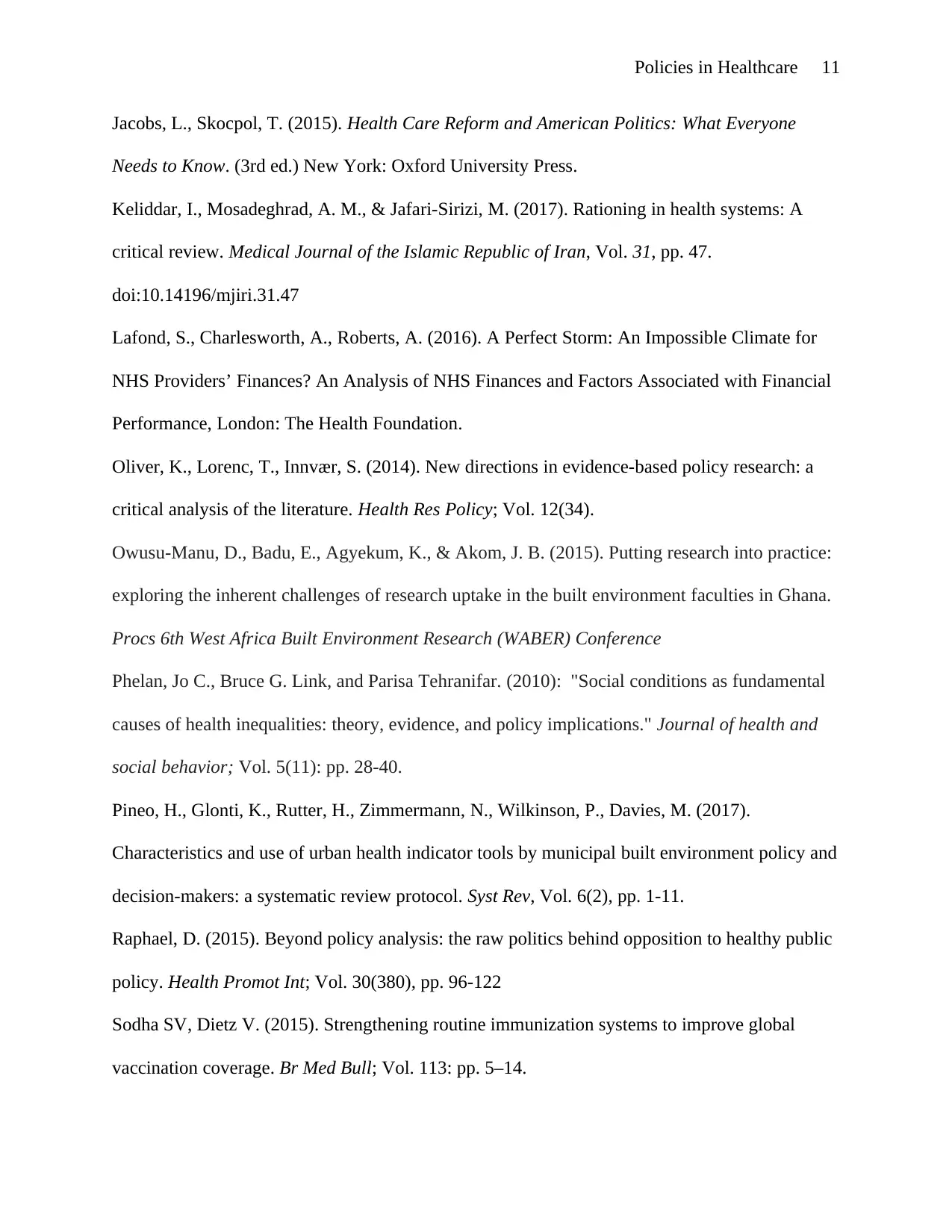
Policies in Healthcare 11
Jacobs, L., Skocpol, T. (2015). Health Care Reform and American Politics: What Everyone
Needs to Know. (3rd ed.) New York: Oxford University Press.
Keliddar, I., Mosadeghrad, A. M., & Jafari-Sirizi, M. (2017). Rationing in health systems: A
critical review. Medical Journal of the Islamic Republic of Iran, Vol. 31, pp. 47.
doi:10.14196/mjiri.31.47
Lafond, S., Charlesworth, A., Roberts, A. (2016). A Perfect Storm: An Impossible Climate for
NHS Providers’ Finances? An Analysis of NHS Finances and Factors Associated with Financial
Performance, London: The Health Foundation.
Oliver, K., Lorenc, T., Innvær, S. (2014). New directions in evidence-based policy research: a
critical analysis of the literature. Health Res Policy; Vol. 12(34).
Owusu-Manu, D., Badu, E., Agyekum, K., & Akom, J. B. (2015). Putting research into practice:
exploring the inherent challenges of research uptake in the built environment faculties in Ghana.
Procs 6th West Africa Built Environment Research (WABER) Conference
Phelan, Jo C., Bruce G. Link, and Parisa Tehranifar. (2010): "Social conditions as fundamental
causes of health inequalities: theory, evidence, and policy implications." Journal of health and
social behavior; Vol. 5(11): pp. 28-40.
Pineo, H., Glonti, K., Rutter, H., Zimmermann, N., Wilkinson, P., Davies, M. (2017).
Characteristics and use of urban health indicator tools by municipal built environment policy and
decision-makers: a systematic review protocol. Syst Rev, Vol. 6(2), pp. 1-11.
Raphael, D. (2015). Beyond policy analysis: the raw politics behind opposition to healthy public
policy. Health Promot Int; Vol. 30(380), pp. 96-122
Sodha SV, Dietz V. (2015). Strengthening routine immunization systems to improve global
vaccination coverage. Br Med Bull; Vol. 113: pp. 5–14.
Jacobs, L., Skocpol, T. (2015). Health Care Reform and American Politics: What Everyone
Needs to Know. (3rd ed.) New York: Oxford University Press.
Keliddar, I., Mosadeghrad, A. M., & Jafari-Sirizi, M. (2017). Rationing in health systems: A
critical review. Medical Journal of the Islamic Republic of Iran, Vol. 31, pp. 47.
doi:10.14196/mjiri.31.47
Lafond, S., Charlesworth, A., Roberts, A. (2016). A Perfect Storm: An Impossible Climate for
NHS Providers’ Finances? An Analysis of NHS Finances and Factors Associated with Financial
Performance, London: The Health Foundation.
Oliver, K., Lorenc, T., Innvær, S. (2014). New directions in evidence-based policy research: a
critical analysis of the literature. Health Res Policy; Vol. 12(34).
Owusu-Manu, D., Badu, E., Agyekum, K., & Akom, J. B. (2015). Putting research into practice:
exploring the inherent challenges of research uptake in the built environment faculties in Ghana.
Procs 6th West Africa Built Environment Research (WABER) Conference
Phelan, Jo C., Bruce G. Link, and Parisa Tehranifar. (2010): "Social conditions as fundamental
causes of health inequalities: theory, evidence, and policy implications." Journal of health and
social behavior; Vol. 5(11): pp. 28-40.
Pineo, H., Glonti, K., Rutter, H., Zimmermann, N., Wilkinson, P., Davies, M. (2017).
Characteristics and use of urban health indicator tools by municipal built environment policy and
decision-makers: a systematic review protocol. Syst Rev, Vol. 6(2), pp. 1-11.
Raphael, D. (2015). Beyond policy analysis: the raw politics behind opposition to healthy public
policy. Health Promot Int; Vol. 30(380), pp. 96-122
Sodha SV, Dietz V. (2015). Strengthening routine immunization systems to improve global
vaccination coverage. Br Med Bull; Vol. 113: pp. 5–14.
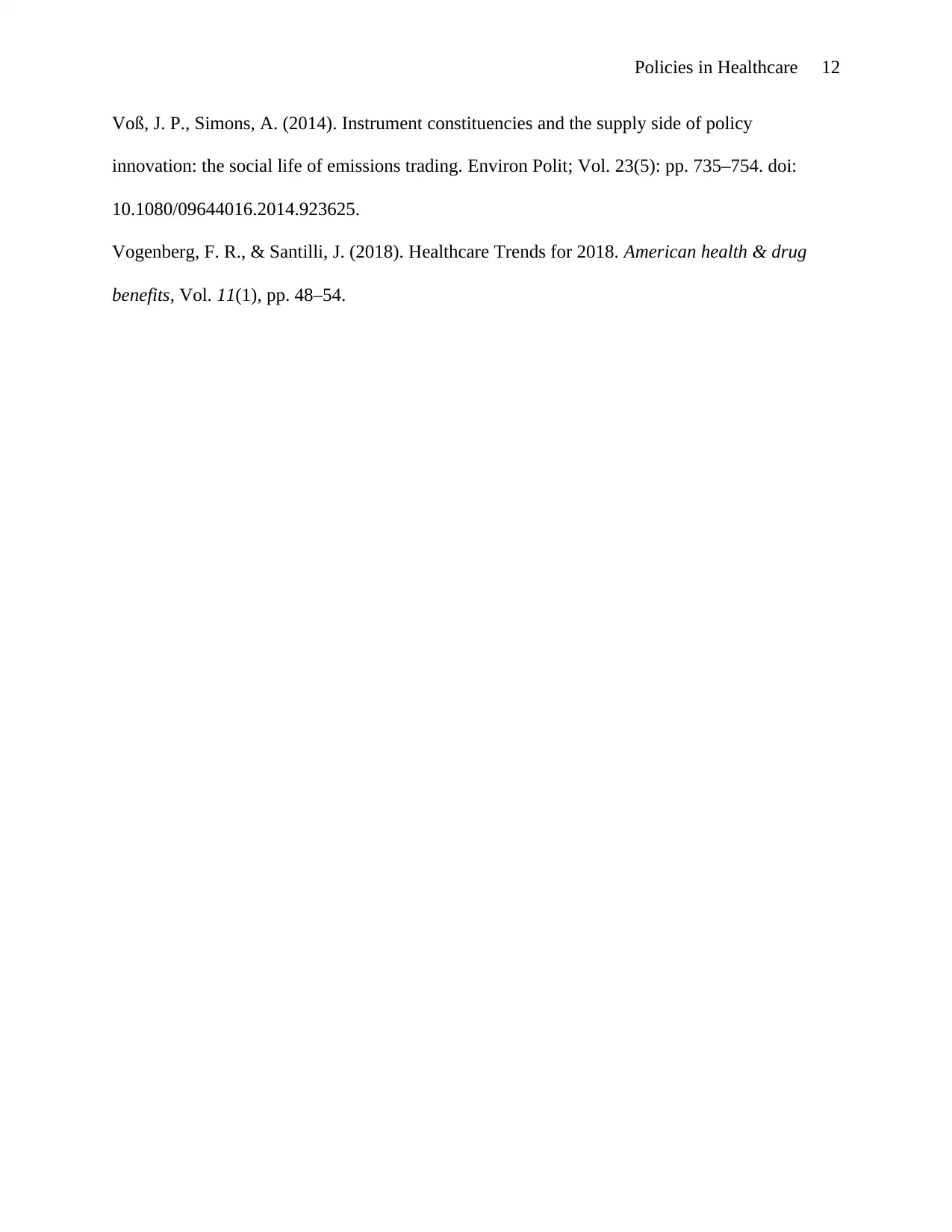
Policies in Healthcare 12
Voß, J. P., Simons, A. (2014). Instrument constituencies and the supply side of policy
innovation: the social life of emissions trading. Environ Polit; Vol. 23(5): pp. 735–754. doi:
10.1080/09644016.2014.923625.
Vogenberg, F. R., & Santilli, J. (2018). Healthcare Trends for 2018. American health & drug
benefits, Vol. 11(1), pp. 48–54.
Voß, J. P., Simons, A. (2014). Instrument constituencies and the supply side of policy
innovation: the social life of emissions trading. Environ Polit; Vol. 23(5): pp. 735–754. doi:
10.1080/09644016.2014.923625.
Vogenberg, F. R., & Santilli, J. (2018). Healthcare Trends for 2018. American health & drug
benefits, Vol. 11(1), pp. 48–54.
⊘ This is a preview!⊘
Do you want full access?
Subscribe today to unlock all pages.

Trusted by 1+ million students worldwide
1 out of 12
Related Documents
Your All-in-One AI-Powered Toolkit for Academic Success.
+13062052269
info@desklib.com
Available 24*7 on WhatsApp / Email
![[object Object]](/_next/static/media/star-bottom.7253800d.svg)
Unlock your academic potential
Copyright © 2020–2026 A2Z Services. All Rights Reserved. Developed and managed by ZUCOL.




